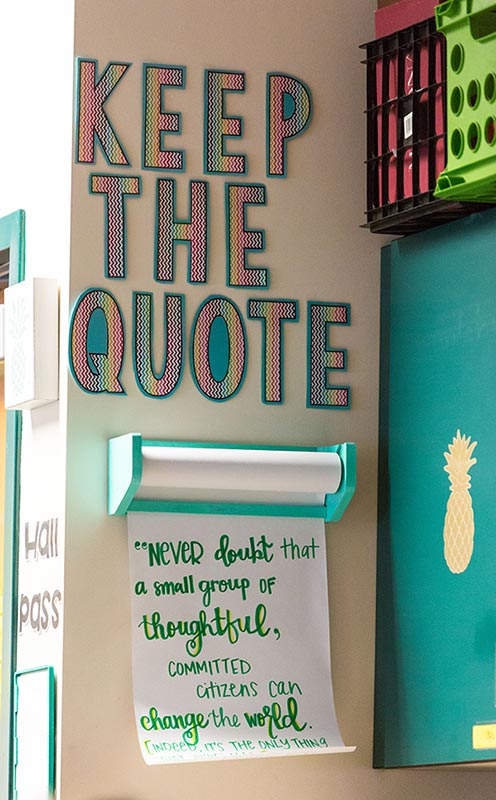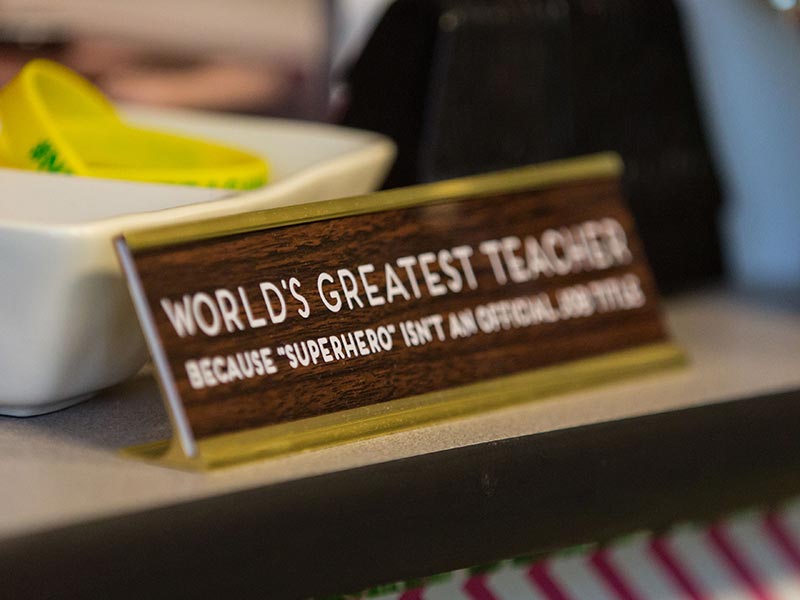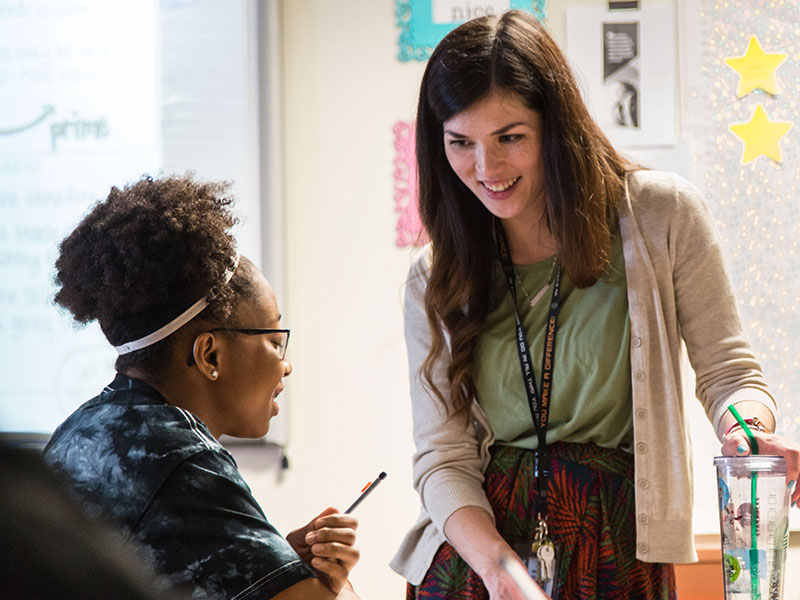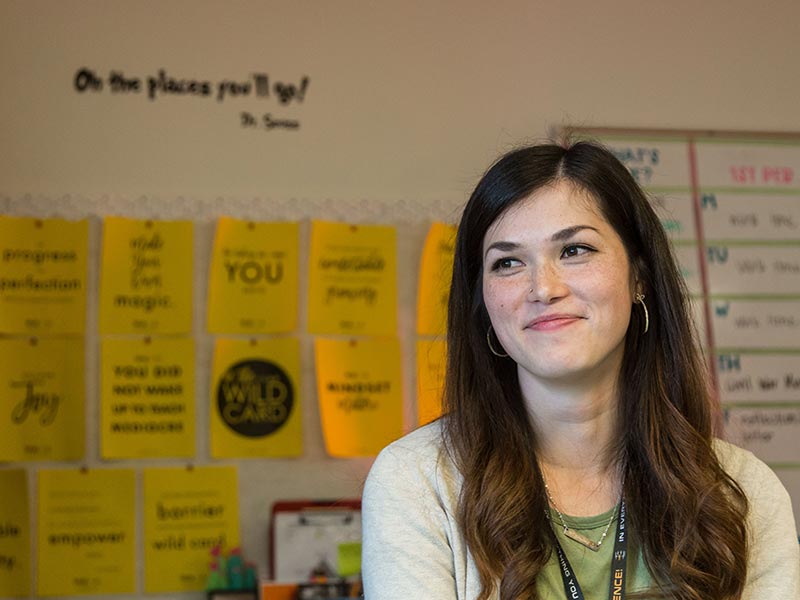
At the start of each school year, Malia Oshiro ’13 proudly introduces herself as a first-generation college graduate. It’s the prologue to her career as an English teacher, a pivotal piece of her story that continues to inform her approach to education — for herself and her students.
But Oshiro didn’t always wear her status as first in the family like a badge of honor. Early in her undergraduate years at Pacific Lutheran University, she kept quiet about it, paralyzed with anxious thoughts nagging in the back of her mind: I don’t deserve to be here. That person is more qualified. Are they going to recognize that I’m here because of my achievements?
“It was almost a shame thing. I didn’t want to talk about it,” Oshiro said. “It’s a thing that makes you different.”
Now, sitting against a backdrop of classroom walls plastered with inspirational literary quotes, she understands how important it is for her to open up about that salient piece of her identity.
“I don’t think I ever had a teacher who was a first-gen student,” she said. “Or they just never talked about it.”
So, she is talking about it.
“It’s always the first thing I mention, that I was a first-gen college student and the first one in my family to get a master’s degree,” she said. “And I did it because I wanted to be the first.”
Her decision to attend college was cultivated at home, by her parents who never earned degrees but constantly stressed the value of education.
Oshiro’s father — born and raised in Oahu, Hawaii — served in the Army as part of the last wave of soldiers to be drafted. Coming from a large family with lots of siblings, college was a distant possibility for him. Still, Oshiro’s “super creative” dad, as she lovingly describes him, attempted to pursue an associate degree in graphic design and visual arts. The birth of Oshiro’s older sister ended that pursuit prematurely.
“He constantly used that as a teachable moment for my siblings and I,” Oshiro said, underscoring the sacrifice he made. “That feeling you have when you’re almost within reach, it’s not something you want to have.”
Oshiro said her mother had limited family support and immediately entered the workforce after graduating from high school, before eventually staying home with her kids. Growing up, Oshiro and her siblings — thanks to their mom — did as much learning at home as they did at school.
“She made sure we would have extra practice with these little workbooks she would buy from Costco,” Oshiro said. “I was surrounded by and immersed in education, school, books, reading. That gave me the love for the subject area I teach, and it was a natural thing for me to become a teacher.”
The extra work was fun, too: “She made it fun,” she said of her mom.
That foundation from her upbringing served as a catalyst for Oshiro’s persistence in pursuing higher education, despite the challenges she knew lay ahead.
“They really emphasized the value of learning,” Oshiro said of her parents. “Once you have an education, you can’t give that up to someone. It’s something you’ll have for the rest of your life.”
Oshiro describes dipping her toe into the college experience as an exercise of “trial by fire.” Her parents already had tested the waters with her older brother, who went to the University of Washington Tacoma for business — a field Oshiro tried to embrace, but knew right away wasn’t a good fit.
“It just didn’t feel right,” she said. “I wasn’t engaged in the content at all.”
Navigating the financial responsibility of college overwhelmed Oshiro, too. Although her mom — at one time a bookkeeper — helped shoulder some of the stress, Oshiro says the jargon and many moving parts prompted a lot of tears.
“I know I’m smart, why am I not understanding this?” she recalled thinking. “After graduation, I was late on three (student loan) payments because I didn’t know where to send the payments to. Stuff was getting lost in the mail. It’s almost like you’re being set up or tricked just for not having known or being born into it.”
Oshiro admits it wasn’t easy transitioning from a place of fear and shame to one of triumph and pride. She rooted herself in the Diversity Center, where she found mentors who helped her reframe her experience.
“Not to minimize it,” she stressed, “but realizing it doesn’t have to be the only thing that defines you.”
Oshiro said her academic spaces also offered valuable support; education professors were compassionate, understanding and relatable during some of her most difficult times, including the death of her grandmother that hit her hard. “I felt comfortable confiding in them,” she said.
While there were plenty of challenges related to her college experience, Oshiro says it made the successes that much sweeter. A euphoric feeling engulfed Oshiro as she walked across the commencement stage five years ago — her late grandmother’s voice echoing in the back of her head, praising her accomplishment. And it was only the beginning.
“I was so hungry for more education,” she said. After a year of teaching, she enrolled in an online master’s program through Walden University, eventually finishing with a 4.0 grade-point average despite teaching full time on the side.
“I don’t know how I did it,” she recalled. “I felt like a crazy person most of the time.”
Oshiro says her first-in-the-family identity informs how she teaches, an approach that continues to evolve.
Monday through Friday, roughly 150 kids rotate through her classroom at Kentridge High School. She admits there are good days and bad days within the minutia.
On bad days, she reminds herself to acknowledge what she can’t see — something she learned navigating her own educational journey.
“You see these kids sitting in desks every day, and there’s not always a visible explanation for why they are the way they are,” she said. “No one wants to fail.”
That understanding came in handy on one of the bad days, when a student swore at her in class. She wrote him up and kicked him out into the hallway.
“I was very dramatic about it, to make sure the other kids knew you don’t speak to an adult that way and you don’t disrespect yourself that way,” she said. “And when I went out there, he was crying.”
She realized the student’s troubles transcended swear words lobbed at a teacher in a classroom. After talking further with the student, Oshiro ripped up the discipline referral. “That eased a lot of his anxiety,” she said. “He had a lot of things going on that he didn’t think his teachers could understand.”
Oshiro could relate to her student in that moment, harkening back to her own brush with failure in college. She underperformed in a couple classes, as a result of her personal anxieties, and risked not graduating.
“I struggled hard with being disciplined and being interested in the work,” she said of the courses, “I failed two exams and ended up having to schedule blocks of time in a study room in the library for hours at a time to force myself to do the work.”
“It was almost a shame thing. I didn’t want to talk about it. It’s a thing that makes you different.”
While that first experience with major failure was terrible, she acknowledges it helped make her a better teacher.
“I think it makes me a lot more empathetic,” Oshiro said of facing adversity in college. “I can better understand people because I know myself better now.”
So, each school year when she talks about the thing that makes her different, Oshiro beams with pride. She says first-generation college students deeply appreciate their educational experience — and it makes institutions better for having them.
“It’s a value for education,” she said. “You really cherish it.”





